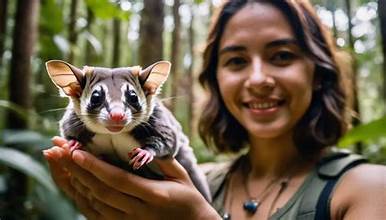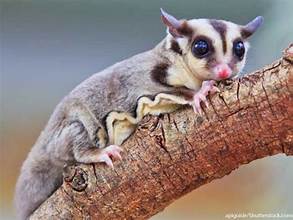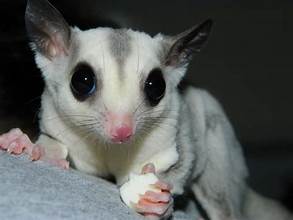While sugar gliders are charming with their large, expressive eyes and playful personalities.
They are not low-maintenance pets. These tiny marsupials have specific needs to thrive.
Before you bring one of these adorable creatures into your home.
It’s essential to understand and be ready to meet their care requirements.
Understanding Your New Pet
Sugar gliders are nocturnal, arboreal mammals native to Australia, Indonesia, and Papua New Guinea. They’re highly social and thrive in groups, and they generally do better with a companion.

Diet: A Balanced Approach
Commercial Pellet Diet:
This should form the base of their diet. Choose a high-quality pellet formulated explicitly for sugar gliders.

Fresh fruits and vegetables:
Offer various, such as apples, bananas, carrots, and spinach, but in moderation. Avoid citrus fruits and avocados, as they can be toxic.

Insects:
These are a vital protein source. Crickets, mealworms, and dubia roaches are popular choices. Ensure they are gut-loaded for optimal nutrition. However, limit these to a few times a week.

Calcium and Vitamin Supplements:
These are crucial for bone health. Consult with a veterinarian for appropriate supplementation.
Honey:
A small amount can be given as a treat, but use it sparingly due to its high sugar content.
Necessary:
Avoid sugary foods, chocolate, caffeine-processed snacks, and excessive fat. Improper diet may lead to serious health issues.
Toys: Keeping Them Entertained
Sugar gliders are intelligent.
It’s our responsibility to keep them mentally stimulated. Rotate toys to prevent boredom.
Some popular options include:
Chew Toys:
Wooden blocks, untreated leather, and safe rope toys can help with dental health.

Puzzle Toys:
Hide treats inside puzzle toys to encourage problem-solving.
Playtime:
Spend quality time with your sugar glider outside the cage, allowing them to explore and bond with you.
Foraging Toys:
Hide treats in toys to stimulate their instincts.
Social Interaction:
Spend quality time with your gliders, gently handling them and providing bonding opportunities.
Climbing toys:
Ropes, ladders, and hanging platforms are perfect for exercise.
Wheel:
While optional, a sugar glider-specific wheel can provide additional exercise.

Essential Care Tips
Veterinary check-ups are essential for maintaining your sugar glider’s health. Signs of illness include lethargy, weight loss, changes in appetite, and abnormal droppings.
Regular Vet Checkups:
Finding a vet experienced in exotic pets for routine checkups and emergencies is crucial. This will give you confidence that you’re doing everything possible to keep your sugar gliders healthy.
When to Take Your Sugar Glider to the Vet?
Socialization:
Spending quality time with your gliders is not just a responsibility; it’s a joy. This is your chance to build trust and bond with your pets.

Cleaning:
Maintaining a clean cage is not just a chore; it’s a responsibility. It’s crucial to preventing health issues and ensuring your sugar gliders live a happy, healthy life.
Dental Care:
Monitor their teeth for overgrowth, as dental problems are common.
Nail Trimming:
This may be necessary, but it’s best to consult a vet first.
Grooming:
Sugar gliders typically groom themselves, but sometimes baths are needed.
Housing: A Vertical Haven
Sugar gliders need a spacious, vertical cage to mimic their natural habitat. Look for a cage with:
Cage Size:
The cage should be as large as possible, with vertical space for climbing. A pair’s minimum size requirement is three feet tall, two feet deep, and two feet wide.

Cage Materials:
Opt for a wire cage with bars spaced closely enough to prevent escapes. Stainless steel is preferable for durability and easy cleaning.
Cage Accessories: Essential items include:
Food and Water Dishes:
Securely attach these to the cage walls to prevent spills.
Hideouts:
Sugar gliders love to hide and sleep during the day. Offer a variety of hideaways, such as pouches, boxes, and hammocks.

Remember
Owning a sugar glider is a significant commitment. They require time, patience, and financial resources. Research thoroughly and consult with experienced sugar glider owners or veterinarians before bringing one home.
Important Note:
Sugar gliders are social animals and perform best in pairs or groups. If you only have one glider, be prepared to dedicate extra time to bonding and playtime.





Pingback: Learn the Best Myths and Facts about Exotic Pets - Positvley Pets